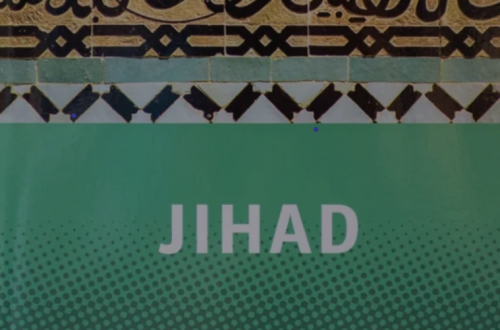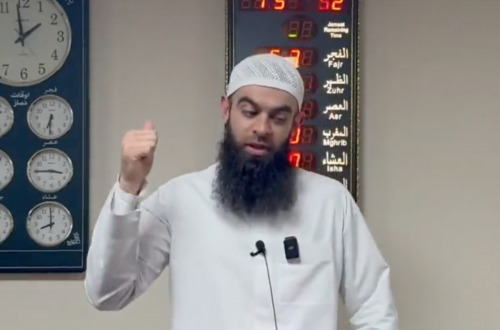This is a guest post by habibi
Azad Ali is the president of the Civil Service Islamic Society (CSIS). This is how the CSIS presents itself on its web site:
The Civil Service Islamic Society (CSIS) was launched in February 2005 and is a non-political, voluntary society, representative of mainstream Islamic opinion in central government. The Society works within the Civil Service framework of honesty, impartiality and integrity. It aims to build on common shared inter-faith values for the benefit of the Civil Service. The mission of the CSIS is to raise awareness of Islam, influence areas of interests and empower its Muslim staff by acting as a representative body of mainstream Islamic affairs. The patron and ambassador of the Civil Service Islamic Society is Sir Gus O’Donnell, Cabinet Secretary and Head of the Home Civil Service.
Azad Ali blogs here under the umbrella of the Islamic Forum of Europe (IFE). The IFE is linked to Jamaat i Islami and the East London Mosque.
Take a look at Ali’s latest post, titled “Defeating extremism by promoting balance”. It is an embittered call to Muslims to stand up for what he sees as a correct understanding of jihad: it is the struggle against “oppression” in religiously appropriate circumstances as well as inner purification. In fact, he opens the post with some words from Huthaifa Azzam, son of Abdullah Azzam, a prominent “Afghan Arab” in the 1980s jihad against the Soviets in Afghanistan, a mentor of Osama bin Laden, and a fanatical Jew hater. Here’s a short video telling part of Azzam père’s story.
While discussing the theological contribution of Azzam fils, Ali cites this quote:
“If I saw an American or British man wearing a soldier’s uniform inside Iraq I would kill him because that is my obligation. If I found the same soldier over the border in Jordan I wouldn’t touch him. In Iraq he is a fighter and an occupier, here he is not. This is my religion and I respect this as the main instruction in my religion for jihad.”
For Azad Ali, apparently these are words of wisdom, for jihad must be reclaimed not from al Qaeda alone, who have bombed Amman, Huthaifa Azzam’s home, but Muslim peaceniks too:
There are a few Muslims who promote the understanding of the term Jihad in its comprehensive glory, one that reflects history as well as the practice of Muslims going back to the Prophet, peace and blessings be upon him.
There are multiple reasons for this, but primarily, in my opinion, it is to do with the restrictions (whether perceived or actual) placed on Muslims by themselves. Self-censorship has taken many Muslims to the point where you can almost feel the contempt they have for Jihad. We have had campaign after campaign that tells people Islam is peace, scholars, activists and droves of Muslims rush to let everyone know that Islam is peace.
Of course this action by the vast majority is noble and I am not knocking that – but I am concerned why they could not say Islam is about Justice – peace is related to Justice. What peace does a man have when he is oppressed? What peace does the soul have when it has transgressed Allah’s boundaries? Is it not said that Muslims are in the category of Nafs (soul) al-Lawamma (questioning/blame) and we aspire to be in the category of Nafs al-Mutma’innah (soul at peace)?By this approach we have caused disillusionment and in some instances radical and extreme reactions from within.
You may take Shaykh Anwar Awlaki as an example. Reading his blogs, one cannot help but feel his frustration at the constant denial of legitimate Islamic principles. Worse is the complete incompetence of some Muslims to distinguish between Jihad and acts of murder.
Though the wording is cautious, surely Azad Ali is citing Azzam fils as an example to follow precisely because he supports the murder – yes, it would be murder – of British soldiers in Iraq.
He does not say what British Muslims should do if jihad is an obligation. Perhaps a civil servant could ask him.
This is very dangerous talk. Supporting jihad in Iraq, or other “occupied” lands for that matter, is bad enough. Worse, at home in Britain, is the conclusion the angriest young men who hear the likes of it may draw. If the British army in Iraq is certainly a legitimate target, the state is its master, and voters and taxpayers choose the government and fund the army, why not mount attacks in the UK? This is indeed a message that recurs in “martyrdom videos” of arrested British jihadis.
Note too Azad Ali’s citation of Anwar al Awlaki, an American Yemeni Islamist, in the quotes above. Ali is fond of al Awlaki, calling him “one of my favourite speakers and scholars” and saying “I really do love him for the sake of Allah, he has an uncanny way of explaining things to people which is endearing”. In this post Ali is referring specifically to this hateful screed, where al Awlaki claims America is at war with Islam “and not just against the so called extremists”; insists that Muslims have a duty “to strive through Jihad to establish the Islamic Khilafah [caliphate]; and compares American Muslims who particpated in the presidential election to abused dogs that remain loyal to their “owners” only because they are given a bone once in a while.
In a related post on the American election, al Awlaki calls American Muslims who voted in the presidential election “house negros” and tells them “you will always be seen as the enemy and you will never be accepted unless you do one thing: give up your religion”.
Mr al Awlaki is, well, quite unbalanced. So is anyone who admires him, such as Azad Ali, for example.
Turning back to Britain, Azad Ali thinks that the government’s domestic anti-extremism measures are bound to fail, and he says so, bluntly:
The millions pumped in by the government to ‘de-radicalise’ Muslims will be a complete waste and will not really achieve anything other than one or two headlines here and there. The real victory will come when we start promoting ‘balance’ in this matter (and in our religion) and not either of the two extremes.
“Balance”, as far as Azad Ali is concerned, appears to mean buying into Azzam’s conception of jihad in order to “defeat extremism”. What else, in practice, does Ali expect the government to do? To support jihadi politics overseas? To allow those who promote jihad into the UK? To partner with organisations in the UK which are linked to jihadi parties, such as Jamaat-e-Islami and the Muslim Brotherhood?
If CSIS is to make a worthwhile contribution to anti-extremism campaigns, it needs a new president.
The trouble is, Azad Ali has made links with officialdom over many years, which puts him in a strong position when he pushes this dangerous and foolish agenda. See this description of his extensive dealings with various governmental bodies:
Azad Ali is married with 3 children and lives in East London; he has been a community activist for over 20 years. He is a presenter on Muslim Community Radio’s flagship show Easy Talk. Aziz is the former chair of the Muslim Safety Forum and currently leads on the Counter Terrorism work-team for the Forum, working with the Home Office, ACPO and Security Services. Azad is currently the President of the Civil Service Islamic Society and a Board Member of the London CrimeStoppers. He is also a Trustee of the East London Mosque & London Muslim Centre. He chairs the Muslim Council of Britain’s Membership Committee and is a member of its Central Working Committee. He is also the Vice-Chair of Canon Barnet School Board of Governors and Chair of the Saturday Islamic School Board of Governors. He sits on the Strategic Stop & Search Committee and Police Use of Firearms Group with the Met. Azad is also a member of the IPCC’s Community Advisory Group and the Home Office’s Trust and Confidence Community Panel.
As far as CSIS itself goes, many of its activities appear wholly anodyne to me. However, this year part of the proceeds of its annual iftar dinner were passed to Interpal (source here), a charity that is banned in a number of jurisdictions, although not in the United Kingdom. The dinner was attended by Sadiq Khan, MP, and Peter Lewis, head of the Crown Prosecution Service.
What a sad and mad state of affairs. Poor Britain. It needs and deserves much better when it comes to fighting and beating extremism.


